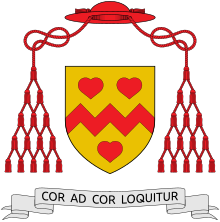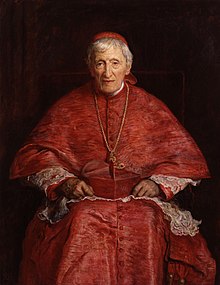公案: 從橄欖神樹(ˊThe olive tree of Vouves, on Crete), 談."現在我們回來了,你們請看,便不同了!"("You shall know the difference, now that I am back again." ) 到 沉默的胡適日記 "
https://www.facebook.com/hanching.chung/videos/496871642649348
Some one, I think, asked<,> in conversation at Rome, whether a certain interpretation of Scripture was Christian? it was answered that Dr. Arnold took it; I interposed, "But is he a Christian?" The subject went out of my head at once; when afterwards I was taxed with it I could say no more in explanation, than <(what I believe was the fact)> that I thought I must have been alluding to [Note 72] some free views of Dr. Arnold about the Old Testament:—I thought I must have meant, "<Arnold answers for the interpretation.> But who is to answer for Arnold?" It was at Rome too that we began the Lyra Apostolica which appeared monthly in the British Magazine. The motto shows the feeling of both Froude and myself at the time: we borrowed from M. Bunsen a Homer, and Froude chose the words in which {135} Achilles, on returning to the battle, says, "You shall know the difference, now that I am back again."
Part 3. History of My Religious Opinions <to the Year 1833>
https://www.newmanreader.org › works › apologia › pa...
Bunsen a Homer, and Froude chose the words in which {135} Achilles, on returning to the battle, says, "You shall know the difference, now that I am back again.".
Part 3. History of My Religious Opinions <to the Year 1833>
https://www.newmanreader.org › works › apologia › pa...
Bunsen a Homer, and Froude chose the words in which {135} Achilles, on returning to the battle, says, "You shall know the difference, now that I am back again.".
IlLiad xviii, I 125
----
English

Newman's personal coat of arms upon his elevation to the cardinalate. The Latin motto, Cor ad cor loquitur, translates as 'heart speaks unto heart'.
2011/3/11
一月的時候 我用幾本英中文查了Iliad,xviii,I.125. 都找不到
"如今 我们回来了,你们请看,要换个样子了!"
所以這是疑案
之後讀了林語堂先生的"我最難忘的人物--胡適之先生" 他在文中已指出出處
我一直沒有時間去查 Reader Digest 的原文
後來又讀胡適之先生遊歐的日記 (約1926) 其中胡適先生也第一次讀Iliad 散文翻譯 發現他以前常用的題辭 是找不到的
****
2011/1/21
2010/12/28 陳維瑲先生整理、萬國雄先生提供 「胡適致胡家健(建人)函」信函複印件影像檔,已放置在徵集 胡適 先生文物影像檔,歡迎點閱。
"朋友 請幫忙找出處 是不是回家時說的 Cardinal Newman"

" 作者:韩石山
"You shall know the difference now that we are back again"
--Iliad,xviii,I.125.
这是胡适一九一七年三月八日写在日记上的一段话。注明是《伊利亚特》第十八章第125 行。他不是直接从该书中摘录的。日记中说,英国十九世纪的宗教改良运动未起时,其未来的领袖纽曼(Newman)、傅鲁得(Froude)、客白儿 (Keble)诸人久以改良宗教期许。三人将其所作的宗教诗歌合为一集,纽曼取荷马诗中这句话题其上。其意若曰:“如今我们回来,你们请看分晓罢。”日记 中又说,此亦可作吾辈留学生之先锋旗也。
多年后,胡适又一次重译这句话时,作了稍许的改动。那是他为清华二十周年校庆的题辞:“如 今 我们回来了,你们请看,要换个样子了!”并加了注说:“当英国‘牛津运动’初起时纽曼取荷马此句题他和几个同志的诗集,我现在也用这句话来祝清华二十周年 纪念。”还是后来的翻译,更符合原意。..."
***
http://blog.sina.com.cn/s/blog_65df105a0100oj4w.html
這些信都沒收入北京大學的胡適書信集
胡適致胡家健(建人)函頁1(未知日期) 陳維瑲先生整理、萬國雄先生提供1955年5月12日胡適致胡家健(建人)函 陳維瑲先生整理、萬國雄先生提供胡適致胡家健(建人)函頁1(未知日期) 陳維瑲先生整理、萬國雄先生提供
胡適致胡家健(建人)函頁1(未知日期) 陳維瑲先生整理、萬國雄先生提供
Apologia Pro Vita Sua (Latin: A defence of one's life) is the classic defence by John Henry Newman of his religious opinions, published in 1864 in response to what he saw as an unwarranted attack on him, the Catholic priesthood, and Roman Catholic doctrine by Charles Kingsley. The work quickly became a bestseller and has remained in print to this day. The work was tremendously influential in turning public opinion for Newman, and in establishing him as one of the foremost exponents of Catholicism in England.
After a brief and unsatisfactory correspondence with Kingsley, Newman began work on the Apologia. A revised version, with many passages re-written and some parts omitted, was published in 1865.
4/4/1102
*HC 書評 : 寫胡適傳記前需先認真讀胡適全集
江勇振先生在本書的最末頁引的
"You shall know the difference now that we are back again"
--Iliad,xviii,I.125.
其實有轉引的疏忽:
2011/3/11
一月的時候 我用幾本英中文查了Iliad,xviii,I.125. 都找不到
"如今 我们回来了,你们请看,要换个样子了!"
所以這是疑案
之後讀了林語堂先生的"我最難忘的人物--胡適之先生" 他在文中已指出出處
我一直沒有時間去查 Reader Digest 的原文
後來又讀胡適之先生遊歐的日記 (1926) 其中胡適先生也第一次讀Iliad 散文翻譯 發現他以前常用的題辭 是找不到的
----
| 聖若望·亨利·紐曼 Saint John Henry Newman | |
|---|---|
| 維拉布洛聖喬治執事區領銜執事 | |
 | |
| 任期 | 1879年5月12日-1890年8月11日[1] |
| 前任 | 多默·馬爾蒂內利[2] |
| 繼任 | 方濟各·愛登·加斯奎特[2] |
| 聖秩 | |
| 晉鐸 | 於1825年5月29日(英格蘭教會)及1847年5月30日(天主教會)[1]晉鐸 |
| 擢升樞機 | 由教宗良十三世 於1879年5月12日擢升 |
| 等級 | 執事級樞機 |
| 個人資料 | |
| 本名 | John Henry Newman |
| 出生 | 1801年2月21日 倫敦 |
| 逝世 | 1890年8月11日(89歲) 艾格巴斯 |
| 格言 | Cor ad cor loquitur[1] |
| 牧徽 |  |
| 聖徒 | |
| 宣福 | 由教宗本篤十六世 於2010年9月19日 在英格蘭伯明罕宣福 |
| 封聖 | 由教宗方濟各 於2019年10月13日 在梵蒂岡聖伯多祿廣場封聖 |
| 主保 | 天主教沃爾辛厄姆聖母特別主教轄區 |
English

2013年1月23日 星期三
"現在我們回來了,你們請看,便不同了!""You shall know the difference, now that I am back again."
胡適日記1921.4.30天津”旅津全國校友聯合會”演說 引Cardinal Newman
"You shall see the difference now that I am back again. 字和標點都有差異
正解:
"You shall know the difference, now that I am back again."
"現在我們回來了,你們請看,便不同了!"
2011/3/11
一月的時候 我用幾本英中文查了Iliad,xviii,I.125. 都找不到
"如今 我们回来了,你们请看,要换个样子了!"
所以這是疑案
之後讀了林語堂先生的"我最難忘的人物--胡適之先生" 他在文中已指出出處
我一直沒有時間去查 Reader Digest 的原文
後來又讀胡適之先生遊歐的日記 (約1926) 其中胡適先生也第一次讀Iliad 散文翻譯 發現他以前常用的題辭 是找不到的
****
2011/1/21
2010/12/28 陳維瑲先生整理、萬國雄先生提供 「胡適致胡家健(建人)函」信函複印件影像檔,已放置在徵集 胡適 先生文物影像檔,歡迎點閱。
"朋友 請幫忙找出處 是不是回家時說的 Cardinal Newman"

" 作者:韩石山
"You shall know the difference now that we are back again"
--Iliad,xviii,I.125.
这是胡适一九一七年三月八日写在日记上的一段话。注明是《伊利亚特》第十八章第125 行。他不是直接从该书中摘录的。日记中说,英国十九世纪的宗教改良运动未起时,其未来的领袖纽曼(Newman)、傅鲁得(Froude)、客白儿 (Keble)诸人久以改良宗教期许。三人将其所作的宗教诗歌合为一集,纽曼取荷马诗中这句话题其上。其意若曰:“如今我们回来,你们请看分晓罢。”日记 中又说,此亦可作吾辈留学生之先锋旗也。
多年后,胡适又一次重译这句话时,作了稍许的改动。那是他为清华二十周年校庆的题辞:“如 今 我们回来了,你们请看,要换个样子了!”并加了注说:“当英国‘牛津运动’初起时纽曼取荷马此句题他和几个同志的诗集,我现在也用这句话来祝清华二十周年 纪念。”还是后来的翻译,更符合原意。..."
***
http://blog.sina.com.cn/s/blog_65df105a0100oj4w.html
這些信都沒收入北京大學的胡適書信集
胡適致胡家健(建人)函頁1(未知日期) 陳維瑲先生整理、萬國雄先生提供1955年5月12日胡適致胡家健(建人)函 陳維瑲先生整理、萬國雄先生提供胡適致胡家健(建人)函頁1(未知日期) 陳維瑲先生整理、萬國雄先生提供
Apologia Pro Vita Sua (Latin: A defence of one's life) is the classic defence by John Henry Newman of his religious opinions, published in 1864 in response to what he saw as an unwarranted attack on him, the Catholic priesthood, and Roman Catholic doctrine by Charles Kingsley. The work quickly became a bestseller and has remained in print to this day. The work was tremendously influential in turning public opinion for Newman, and in establishing him as one of the foremost exponents of Catholicism in England.
After a brief and unsatisfactory correspondence with Kingsley, Newman began work on the Apologia. A revised version, with many passages re-written and some parts omitted, was published in 1865.
4/4/1102
Oxford Movement - Wikipedia, the free encyclopedia
-The Oxford Movement was a movement of High Church Anglicans, eventually developing into Anglo-Catholicism. The movement, whose members were often associated ...*HC 書評 : 寫胡適傳記前需先認真讀胡適全集
江勇振先生在本書的最末頁引的
"You shall know the difference now that we are back again"
--Iliad,xviii,I.125.
其實有轉引的疏忽:
2011/3/11
一月的時候 我用幾本英中文查了Iliad,xviii,I.125. 都找不到
"如今 我们回来了,你们请看,要换个样子了!"
所以這是疑案
之後讀了林語堂先生的"我最難忘的人物--胡適之先生" 他在文中已指出出處
我一直沒有時間去查 Reader Digest 的原文
後來又讀胡適之先生遊歐的日記 (1926) 其中胡適先生也第一次讀Iliad 散文翻譯 發現他以前常用的題辭 是找不到的
2011年1月21日 星期五
「胡適致胡家健函」/如今 我们回来了,你们请看,要换个样子了!
2011/3/11
一月的時候 我用幾本英中文查了Iliad,xviii,I.125. 都找不到
"如今 我们回来了,你们请看,要换个样子了!"
所以這是疑案
之後讀了林雨堂先生的"我最難忘的人物--胡適之先生" 他在文中已指出出處
我一直沒有時間去查 Reader Digest 的原文
後來又讀胡適之先生遊歐的日記 (約1926) 其中胡適先生也第一次讀Iliad 散文翻譯 發現他以前常用的題辭 是找不到的
****
2011/1/21
2010/12/28 陳維瑲先生整理、萬國雄先生提供 「胡適致胡家健(建人)函」信函複印件影像檔,已放置在徵集 胡適 先生文物影像檔,歡迎點閱。
"朋友 請幫忙找出處 是不是回家時說的 Cardinal Newman"

" 作者:韩石山
"You shall know the difference now that we are back again"
--Iliad,xviii,I.125.
这是胡适一九一七年三月八日写在日记上的一段话。注明是《伊利亚特》第十八章第125 行。他不是直接从该书中摘录的。日记中说,英国十九世纪的宗教改良运动未起时,其未来的领袖纽曼(Newman)、傅鲁得(Froude)、客白儿 (Keble)诸人久以改良宗教期许。三人将其所作的宗教诗歌合为一集,纽曼取荷马诗中这句话题其上。其意若曰:“如今我们回来,你们请看分晓罢。”日记 中又说,此亦可作吾辈留学生之先锋旗也。
多年后,胡适又一次重译这句话时,作了稍许的改动。那是他为清华二十周年校庆的题辞:“如今 我们回来了,你们请看,要换个样子了!”并加了注说:“当英国‘牛津运动’初起时纽曼取荷马此句题他和几个同志的诗集,我现在也用这句话来祝清华二十周年 纪念。”还是后来的翻译,更符合原意。..."
http://blog.sina.com.cn/s/blog_65df105a0100oj4w.html
這些信都沒收入北京大學的胡適書信集
胡適致胡家健(建人)函頁1(未知日期) 陳維瑲先生整理、萬國雄先生提供1955年5月12日胡適致胡家健(建人)函 陳維瑲先生整理、萬國雄先生提供胡適致胡家健(建人)函頁1(未知日期) 陳維瑲先生整理、萬國雄先生提供
胡適致胡家健(建人)函頁1(未知日期) 陳維瑲先生整理、萬國雄先生提供
一月的時候 我用幾本英中文查了Iliad,xviii,I.125. 都找不到
"如今 我们回来了,你们请看,要换个样子了!"
所以這是疑案
之後讀了林雨堂先生的"我最難忘的人物--胡適之先生" 他在文中已指出出處
我一直沒有時間去查 Reader Digest 的原文
後來又讀胡適之先生遊歐的日記 (約1926) 其中胡適先生也第一次讀Iliad 散文翻譯 發現他以前常用的題辭 是找不到的
****
2011/1/21
2010/12/28 陳維瑲先生整理、萬國雄先生提供 「胡適致胡家健(建人)函」信函複印件影像檔,已放置在徵集 胡適 先生文物影像檔,歡迎點閱。
"朋友 請幫忙找出處 是不是回家時說的 Cardinal Newman"

" 作者:韩石山
"You shall know the difference now that we are back again"
--Iliad,xviii,I.125.
这是胡适一九一七年三月八日写在日记上的一段话。注明是《伊利亚特》第十八章第125 行。他不是直接从该书中摘录的。日记中说,英国十九世纪的宗教改良运动未起时,其未来的领袖纽曼(Newman)、傅鲁得(Froude)、客白儿 (Keble)诸人久以改良宗教期许。三人将其所作的宗教诗歌合为一集,纽曼取荷马诗中这句话题其上。其意若曰:“如今我们回来,你们请看分晓罢。”日记 中又说,此亦可作吾辈留学生之先锋旗也。
多年后,胡适又一次重译这句话时,作了稍许的改动。那是他为清华二十周年校庆的题辞:“如今 我们回来了,你们请看,要换个样子了!”并加了注说:“当英国‘牛津运动’初起时纽曼取荷马此句题他和几个同志的诗集,我现在也用这句话来祝清华二十周年 纪念。”还是后来的翻译,更符合原意。..."
http://blog.sina.com.cn/s/blog_65df105a0100oj4w.html
這些信都沒收入北京大學的胡適書信集
胡適致胡家健(建人)函頁1(未知日期) 陳維瑲先生整理、萬國雄先生提供1955年5月12日胡適致胡家健(建人)函 陳維瑲先生整理、萬國雄先生提供胡適致胡家健(建人)函頁1(未知日期) 陳維瑲先生整理、萬國雄先生提供
| Translations from Homer |
| The Iliad Book XVIII. The Grief of Achilles, and New Armour Made Him by Vulcan |
| |||||||||||||||||||||||||||||||||||||||||||||||||||||||||||||||||||||||||||||||||||||||||||||||||||||||||||||||||||||||||||||||||||||||||||||||||||||||||||||||||||||||||||||||||||||||||||||||||||||||||||||||||||||||||||||||||||||||||||||||||||||||||||||||||||||||||||||||||||||||||||||||||||||||||||||||||||||||||||||||||||||||||||||||||||||||||||||||||||||||||||||||||||||||||||||||||||||||||||||||||||||||||||||||||||||||||||||||||||||||||||||||||||||||||||||||||||||||||||||||||||||||||||||||||||||||||||||||||||||||||||||||||||||||||||||||||||||||||||||||||||||||||||||||||||||||||||||||||||||||||||||||||||||||||||||||||||||||||||||||||||||||||||||||||||||||||||||||||||||||||||||||||||||||||||||||||||||||||||||||||||||||||||||||||||||||||||||||||||||||||||||||||||||||||||||||||||||||||||||||||||||||||||||||||||||||||||||||||||||||||||||||||||||||||||||||||||||||||||||||||||||||||||||||||||||||||||||||||||||||||||||||||||||||||||||||||||||||||||||||||||||||||||||||||||||||||||||||||||||||
|


沒有留言:
張貼留言